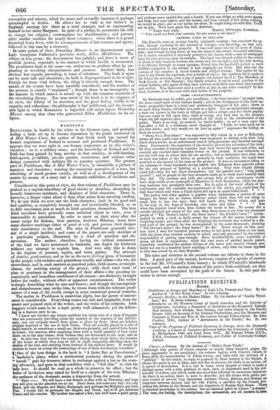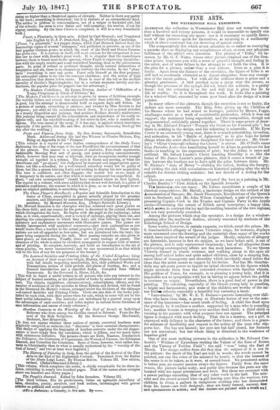PUBLICATIONS RECEIVED.
BOOKS.
Paddiana; or Scraps and Sketches of Irish Life, Present and Past. By the Author of "A Hot Water Cure." In two volumes.
Norman's Bridge; or the Modern Midas. By the Author of" Emilia Wynd- ham," &c. In three volumes. Adventures on the Western Coast of South America and the Interior of California; including a Narrative of Incidents at the Kingsmill Islands, New Ireland, New Britain, New Guinea, and other islands in the Pacific Ocean • with an Account of the Natural Productions, and the Manners and Customs in Peace and War of the various Savage Tribes visited. By John Coulter, M.D., Author of "Adventures in the Pacific," &c. In two volumes. View of the Progress of Political Economy in Europe since the Sixteenth Century; a Course of Lectures delivered before the University of Oxford, in Michaelmas 1846 and Lent Term 1847. By Travers Twiss, D.C.L., F.R.S., Professor of Political Economy, and Fellow of University College, Oxford.
• ■■■■•■••••••
Cicero; aDrama. By the Author of " Moile's State Trials." [Although this quarto of rhyme extends to nearly three hundred pages, the poem apparently is not completed: the volume begins with Cicero's return to Rome after the assassination of Julius Cwsar, and ends with the delivery of a " phillipic" by the orator, in reply to a speech by Marc Antony in the Senate. A drama the poem is not in form, and still less in essence, for there is no action; all is speech or description. It is a tale in verse, every chapter of which is made a distinct scene, with a title prefixed to each, such as Ainsworth used in his Ad- mirable Crichton, and which mode has since been followed by numerous imitators. As there is no action, there is none to describe; but the scenes with public per- sons consist of several long discourses between Cicero, Atticus, and Brutus, an interview between Antony and his wife Fulvia, a sacrifice by the Consul pre- ceding the debate in the Senate, and the departure of Brutus from Rome. Thaw is classical knowledge in the author, but no classical spirit in Cicero" a drama." The tone, the feeling, the descriptions, the accessories, are all modern in idea. !lidless no higher than a theatrical species of chivalry. Neither is there any poetry in the book; everything is rhetorical; but it is rhetoric of an extraordinary kind. The author is profuse in commonplaces, not of a vulgar or hacknied sort, but of the schools; his verse is ever fluent and well sounding; his motion, if not his sigour, untiring. By the time Cicero is completed, it will be a very remarkable
• book.]
Faust; a Phantasi ,a in three acts. Edited by Carl Simrock ; and Translated into English by D. J. P. Drakeford, Esq., St. Peter's College, Cambridge. [Faust, "a phantasia," is a puppet drama, which Carl Shurock derived from the manuscript copies of several "managers," and published to preserve, as one of the best popular German poems to which the story of the Devil and Doctor Faustus has given rise. It is curious in itself, still more curious for the comparison it ena- bles one to draw with Goethe's great work. It is singular that the resemblance between them is found more in the opening, where Faust is expressing dissatisfac- tion with the empty results and scant rewards of learning, than in the adventurous parts. In point of refined or profound thought, nicely natural delineations of temptation and sin, there is no comparison between the two works. In the " phan- tasia ' everything is curt and gross. Faust sells himself at the first proposal; his subsequent career is too like the common charlatan; and the notion of high life resembles that drawn below stairs. There is none of the wit or the devilish rascality of Goethe's Mephistopheles; but in a certain dramatic brevity and dis- tinctness, the popular piece for puppets has the advantage.] The Modern Unbeliever. By Emma Newton, Author of "Difficulties of a Young Clergyman in Times of Division," &c. [The Modern Unbeliever is an attempt to prove, by means of fictitious example, the worldly failure and misery that necessarily arise from infidelity. The object Is good, but the attempt is unsuccessful both as regards logic and fiction. As a picture of society, everything is extreme, and twisted by Miss Newton to her purposes; yet after all the conclusions break down. It is not so much unbelief; as a moody disposition and jealousy, that produce Wallace Arnold's misfortunes; this jealousy being caused by the concealments and imprudence of his really re- ligious wife, and the mischief-making of her sister-in-law, who is nominally re- ligious. The true moral of the story, if it has any, is against mixed marriages; especially if the parties, like Mr. and Mrs. Arnold, begin discussing theology the day after the wedding.] Facts and Figures from Italy. By Don Jeremy Savonarola, Benedictine Monk. Addressed during the last two Winters to Charles Dickens, Esq. Being an Appendix to his " Pictures." [This volume is a reprint of some Italian correspondence of the Daily News; embracing the close of the reign of the last Pontiff and the commencement of that of the present. The matter is a mixture of statistics, Free-trade arguments, fashionable Morning Post sort of gossip, and penny-a-lining announcements; which, however they may read at intervals, form an incongruous medley enough brought all together in a volume. The style is fluent and moving, or what the Americans call go-ahead," hut disfigured by incessant and inappropriate quota- tions; not like a schoolboy, for a well-trained schoolboy would not be guilty of them' but like a person learning Latin and wishing to display his new acquisition. The tone is confident, and often flippant; the matter but so-so; much of it temporary in its nature, and that which is more permanent too superficial. In
"our our own correspondent" should have remained where he first lighted. 'The reprint in a volume, with some additions that do not well dovetail, is a piece of mistaken confidence: the manner in which it is done, so as to lead people to ex- pect an original publication, is something worse.]
The Chess-Player's Handbook; a Popular and Scientific Introduction to the Game of Chess, exemplified in games actually played by the greatest masters, and illustrated by numerous Diagrams of original and remarkable positions. By Howard Staunton, Esq. (Bohn's Scientific Library.)
[Mr. Howard Staunton is the champion who has achieved such great glories on the chess field; and one reason for his power is discerned in the crystal clearness which distinguishes his book. He begins with the pupil at the beginning; takes him, as it were, experimentally, over a variety of openings, playing them out, and showing the consequences to which they lead; and then following up the more initiatory and explanatory movements with illustrative games. The games are thickly interspersed with analytical comments,—just such explanations as you would desire from a teacher in the actual progress of your studies. These expla- nations are not all appended as foot-notes, but are introduced into the text; the game being suspended during the talk. More passing remarks are also given in some places as foot-notes. Finally, there are many endings of games. The clearness of whole is aided by excellent arrangement in respect both of matter and of printing. So complete, masterly, and lucid an introduction to the art of chess-playing, we never encountered; and we can recommend it as that which will be the best of any for the purposes of the learner.]
The Learned Societies and Printing. Clubs of the United Kingdom: being an Account of their respective Origin History, Objects, and Constitution; with full details respecting membership, fees, thew published Works and
• Transactions, notices of their periods and places of meeting, &c; and a General Introduction and a classified Index. Compiled from Official Documents. By the Reverend A. Hume, LL.D., &c. [This will be found a useful volume to all persons who take any interest in the subject of learned societies, or the publication of books by associations of subscri- bers. The objects, regulations, entrance-money, subscriptions, officers, and the number of members of all the societies in Great Britain and Ireland, will be found in the Reverend Dr. Hume's volume, arranged under the divisions o.f the titlepage
• ,.Learned Societies and Printing Clubs. There are also lists of the books pub- lished by each club, with their prices when for sale, which to some will not be the least useful information. The statistics are introduced by a general essay upon the advantages of such societies • and index matter in various forms furnishes at once information and means of ready reference.] Heathen Converts to the Worship of the God of Israel; or Individual
• Believers who from among the Gentiles turned to Jehovah. From the Re- cord of the Holy Scriptures. By the Reverend George Macdonnell, Bathurst, New Brunswick.
It does not appear whether these notices of certain converted heathens were originally composed as sermons; but " discourse " is their essential characteristic. The design of applying the biography of heathen converts under the old dispen- sation is more happy than the execution; which is diffuse, and too much laden With extraneous hortative. The persons chosen are Rath, Naamius Ebedmelech the Ethiopian, the Centurion of Capernaum, the Woman of Canaan, the Ethiopian Fatnneb, and Cornelius the Centurion. Some of these, however, were rather con- verts to Christianity than to what is usually understood by the "worship of the God of Israel," and two at least were baptized.] • The History of Painting in Italy, from the period of the Revival of the Fine Arts to the End of the Eighteenth Century. Translated from the Italian of the Abate Luigi Lanai. By Thomas Roscoe. Volume III. New edition, revised. (Bohn's-Seendard Library.)
This volume, which completes the series, is chiefly remarkable for its three in- eras, extending to nearly two hundred pages. That of the names alone occupies above one hundred and thirty pages.]
The People's Journal. Edited by John Saunders. Volume III.
Sate third volume, like its predecessors, forms an agreeable miscellany of sketches, poetry, anecdote, and book notices, intermingled with graver arUcles on political and social questions.]
Airs a Delusion; a Comedy, in five acts. By--s



























 Previous page
Previous page